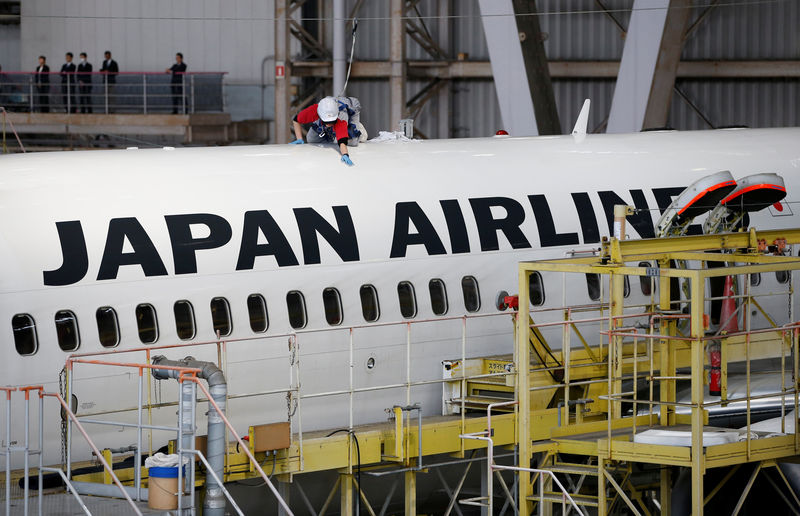By Leika Kihara and Tetsushi Kajimoto
TOKYO (Reuters) - Japanese business sentiment worsened for the first time in two years in the three months to March, a closely watched central bank survey showed on Monday, as rising raw materials and labor costs weigh on an otherwise steady economic recovery.
A strong yen and simmering fears of a trade war, triggered by U.S. President Donald Trump's move to impose tariffs on Chinese goods, could further undermine corporate morale if threats of retaliation escalate, analysts say.
But few analysts expect the economic recovery to falter as business confidence remains at a decade-high level and companies plan to increase capital expenditure.
"Yen gains since late January have eroded manufacturers' sentiment but solid global economic fundamentals helped offset the pain. Overall, you can say that business confidence held firm," said Yuichiro Nagai, an economist at Barclays (LON:BARC) Securities.
"Fears of a global trade war have had a limited impact on business sentiment so far. But depending on development of U.S. trade policy, protectionism could weigh on the outlook."
An index measuring big manufacturers' confidence fell by 2 points to plus 24 in March, the Bank of Japan's quarterly "tankan" survey showed, roughly matching a median market forecast of plus 25.
Non-manufacturers' sentiment worsened by 2 points to plus 23 against a median forecast of plus 24, deteriorating for the first time in six quarters.
Both big manufacturers and non-manufacturers forecast business conditions would sour three months ahead, the tankan showed, reflecting looming uncertainty over the fallout from Trump's trade policy and a strong yen.
"This should not be taken as turning point for Japan's economy although sentiment deteriorated slightly," said Takeshi Minami, chief economist at Norinchukin Research Institute. "Concerns are high over possible retaliation against U.S. tariffs, but the global economy remains in a gradual recovery which is good for Japan's value-added exports."
About 70 percent of companies replied to the survey by March 12, after Trump unveiled steep tariffs on steel and aluminum imports but before his announcement of anti-China tariffs.
Big manufacturers expect the dollar to move around 109.66 yen on average during the year that began in April, much weaker than the current levels around 106 yen.
If the yen's gains continue, manufacturers may be forced to cut their optimistic profit forecasts - a worry for Prime Minister Shinzo Abe who is pursuing growth with reflationist policies.
LABOR SHORTAGES
Labor shortages also weighed on sentiment, as economic recovery and a dwindling working-age population push the jobless rate to a near 25-year low.
A tankan index measuring capacity constraints showed that companies saw the job market at its tightest since 1991.
"Labor shortages are having a negative impact particularly on labor-intensive service-sector firms," said Satoshi Osanai, senior economist at Daiwa Institute of Research.
He said rising wages could stoke a "virtuous growth cycle" of consumer spending, rising prices and increased investment if companies could pass on their higher costs to generate profit. "The key to making this happen is whether consumers are willing to spend their increased earnings, but so far there's little sign of that happening."
Slow wage growth and companies' reluctance to raise prices have kept inflation well below the Bank of Japan's elusive 2 percent target.
However, the tankan showed more companies were able to pass higher costs on to consumers, a hopeful sign for the central bank.
A tankan index measuring how big manufacturers saw output price moves stood at plus 4, the highest level since 2008, and showing price pressures continue to rise.
Some firms in the construction, restaurant and hotel industries complained that labor shortages were taking a toll on their businesses, a BOJ official briefing reporters on the data said.
Firms in the basic materials business such as those selling steel, nonferrous metals and textiles saw sentiment hurt by rising cost of raw materials, the official said.
The index measuring steelmakers' sentiment fell 9 points, the biggest drop among big manufacturers, while confidence also slumped among producers of nonferrous metals and metal products.
Still, big firms plan to raise their capital spending by 2.3 percent in the current financial year from April, versus the median estimate for a 0.6 percent gain, the tankan showed.

The tankan's sentiment indexes are derived by subtracting the number of respondents who say conditions are poor from those who say they are good. A positive reading means optimists outnumber pessimists.